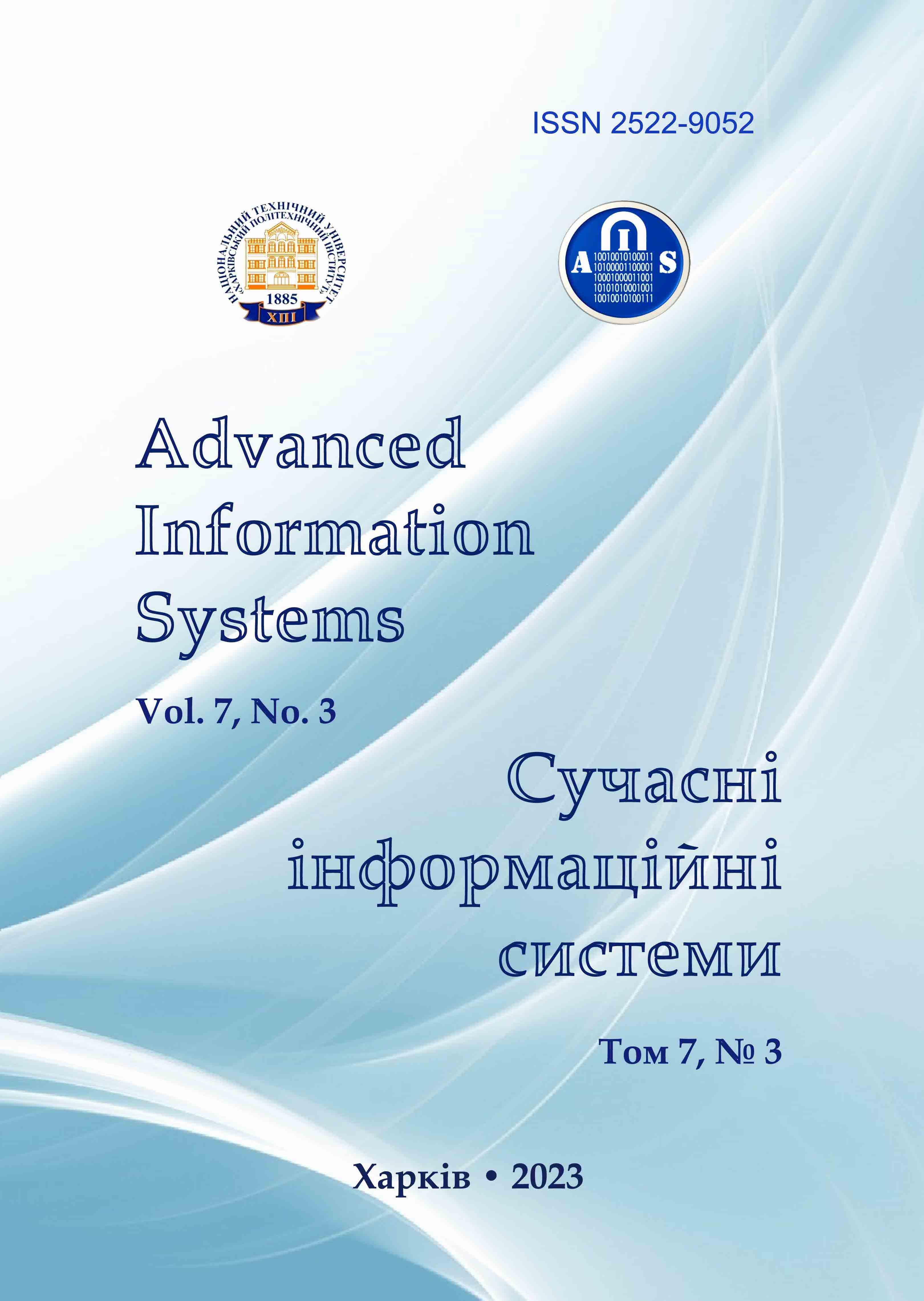METHOD OF ASSESSING THE STATE OF HIERARCHICAL OBJECTS BASED ON BIO-INSPIRED ALGORITHMS
Main Article Content
Abstract
Relevance. Nowadays, no state in the world is able to work on the creation and implementation of artificial intelligence in isolation from others. Artificial intelligence technologies are actively used to solve both general and highly specialized tasks in various spheres of society. In the process of assessing (identifying) the state of complex and objects of analysis and management, there is a high degree of a priori uncertainty regarding their state and a small amount of initial data describing them. At the same time, despite the huge amount of information, the degree of non-linearity, illogicality and noisy data is increasing. That is why the issue of improving the efficiency of assessing the condition of complex and objects is an important and urgent issue. The object of research is the objects of analysis. The subject of the research is the identification and forecasting of the analysis objects state with the help of bio-inspired algorithms. In the research, the evaluation and forecasting method was developed using fuzzy cognitive maps and the genetic algorithm. The novelty of the proposed method consists in: taking into account the degree of uncertainty about the object state while calculating the correction factor; adding a correction factor for data noise as a result of distortion of information about the object state; reduction of computing costs while assessing the objects state; creation of a multi-level and interconnected description of hierarchical objects; adjusting the description of the object as a result of changing its current state using a genetic algorithm; the possibility of performing calculations with the original data, which are different in nature and units of measurement. It is advisable to implement the mentioned method in specialized software, which is used to analyze the state of complex technical systems and make decisions.
Article Details
References
Dudnyk, V., Sinenko, Yu., Matsyk, M., Demchenko, Ye., Zhyvotovskyi, R., Repilo, Iu., Zabolotnyi, O., Simonenko, A., Pozdniakov, P. and Shyshatskyi, A. (2020), “Development of a method for training artificial neural networks for intelligent decision support systems”, Eastern-European Journal of Enterprise Technologies, Vol. 3, No. 2 (105), pp. 37–47, doi: https://doi.org/10.15587/1729-4061.2020.203301.
Sova, O., Shyshatskyi, A., Salnikova, O., Zhuk, O., Trotsko, O. and Hrokholskyi, Y. (2021), “Development of a method for assessment and forecasting of the radio electronic environment”, EUREKA: Physics and Engineering, Vol. (4), pp. 30–40, doi: https://doi.org/10.21303/2461-4262.2021.001940.
Pievtsov, H., Turinskyi, O., Zhyvotovskyi, R., Sova, O., Zvieriev, O., Lanetskii , B. and Shyshatskyi, A. (2020), “Development of an advanced method of finding solutions for neuro-fuzzy expert systems of analysis of the radioelectronic situation”. EUREKA: Physics and Engineering, Vol. (4), pp. 78–89, doi: https://doi.org/10.21303/2461-4262.2020.001353.
Zuiev, P., Zhyvotovskyi, R., Zvieriev, O., Hatsenko, S., Kuprii, V., Nakonechnyi, O., Adamenko, M., Shyshatskyi, A., Neroznak, Y. and Velychko, V(2020), “Development of complex methodology of processing heterogeneous data in intelligent decision support systems”, Eastern-European Journal of Enterprise Technologies, Vol. 4, No. 9 (106), pp.14‒23, doi: https://doi.org/10.15587/1729-4061.2020.208554.
Shyshatskyi, A., Zvieriev, O., Salnikova, O., Demchenko, Ye., Trotsko, O. and Neroznak, Ye. (2020), “Complex Methods of Processing Different Data in Intellectual Systems for Decision Support System”, International Journal of Advanced Trends in Computer Science and Engineering, Vol. 9, No. 4, pp. 5583‒5590, doi: https://doi.org/10.30534/ijatcse/2020/206942020.
Yeromina, N., Kurban, V., Mykus, S., Peredrii, O., Voloshchenko, O., Kosenko, V., Kuzavkov, V., Babeliuk, O., Derevianko, M. and. Kovalov, H. (2021), “The Creation of the Database for Mobile Robots Navigation under the Conditions of Flexible Change of Flight Assignment”, International Journal of Emerging Technology and Advanced Engineering, Vol. 11, No. 05., pp. 37 ‒41, doi: https://doi.org/10.46338/ijetae0521_05.
Ramaji, I. J. and Memari, A. M. (2018), “Interpretation of structural analytical models from the coordination view in building information models”, Automation in Construction, No. 90. pp. 117–133, doi: https://doi.org/10.1016/j.autcon.2018.02.025.
Pérez-González, C. J., Colebrook, M., Roda-García, J. L. and Rosa-Remedios, C. B. (2019), “Developing a data analytics platform to support decision making in emergency and security management”, Expert Systems with Applications, No. 120, pp. 167–184, doi: https://doi.org/10.1016/j.eswa.2018.11.023.
Chen, H. (2018). “Evaluation of Personalized Service Level for Library Information Management Based on Fuzzy Analytic Hierarchy Process”, Procedia Computer Science, No. 131, pp. 952–958, doi: https://doi.org/10.1016/j.procs.2018.04.233.
Chan, H. K., Sun, X. and Chung, S.-H. (2019), “When should fuzzy analytic hierarchy process be used instead of analytic hierarchy process?”, Decision Support Systems, pp. 1–37, doi: https://doi.org/10.1016/j.dss.2019.113114.
Osman, A. M. S(2019), “A novel big data analytics framework for smart cities”. Future Generation Computer Systems, Vol. 91., pp. 620–633, doi: https://doi.org/10.1016/j.future.2018.06.046.
Gödri, I., Kardos, C., Pfeiffer, A. and Váncza, J. (2019), “Data analytics-based decision support workflow for high-mix low-volume production systems”, CIRP Annals, Vol. 68, No.1, pp. 471–474, doi: https://doi.org/10.1016/j.cirp.2019.04.001.
Harding, J. L. (2013), “Data quality in the integration and analysis of data from multiple sources: some research challenges”, International Archives of the Photogrammetry, Remote Sensing and Spatial Information Sciences, XL-2/W1, pp. 59–63, doi: https://doi.org/10.5194/isprsarchives-XL-2-W1-59-2013.
Gorelova, G.V. (2013), “A cognitive approach to the simulation of complex systems”, Izvestia Law U. Technical Sciences, No. 3, pp. 239–250, doi: https://doi.org/10.3182/20080706-5-KR-1001.00275.
Orouskhani, M., Orouskhani, Y., Mansouri, M. and Teshnehlab, M. (2013), “A novel cat swarm optimization algorithm for unconstrained optimization problems”, International Journal “Information Technology and Computer Science”, No. 11, pp. 32–41, doi: https://doi.org/10.5815/ijitcs.2013.11.04.
Shyshatskiy, A.V., Bashkirov, O.M. and Kostina, O.M (2015), “Development of integrated systems and data for Armed Forces”, Arms and military equipment, No 1(5), pp. 35–40. available at: http://journals.uran.ua/index.php/2414-0651/issue/view/1%285%29%202015.
Kalantaievska, S., Pievtsov, H., Kuvshynov, O., Shyshatskyi, A., Yarosh, S., Gatsenko, S., Zubrytskyi, H., Zhyvotovskyi, R., Petruk, S. and Zuiko, V. (2018), “Method of integral estimation of channel state in the multiantenna radio communication systems”, Eastern-European Journal of Enterprise Technologies. Vol. 5, No 9 (95), рр. 60–76. doi: https://doi.org/10.15587/1729-4061.2018.144085.
Zhuk, O.G., Shyshatskiy, A.V., Zhuk, P.V. and Zhyvotovskyi, R.M. (2017), “Methodological substances of management of the radio-resource managing systems of military radio communication”, Information Processing Systems, Vol. 5 (151),
pp. 16–25, doi: https://doi.org/10.30748/soi.2017.151.02.
